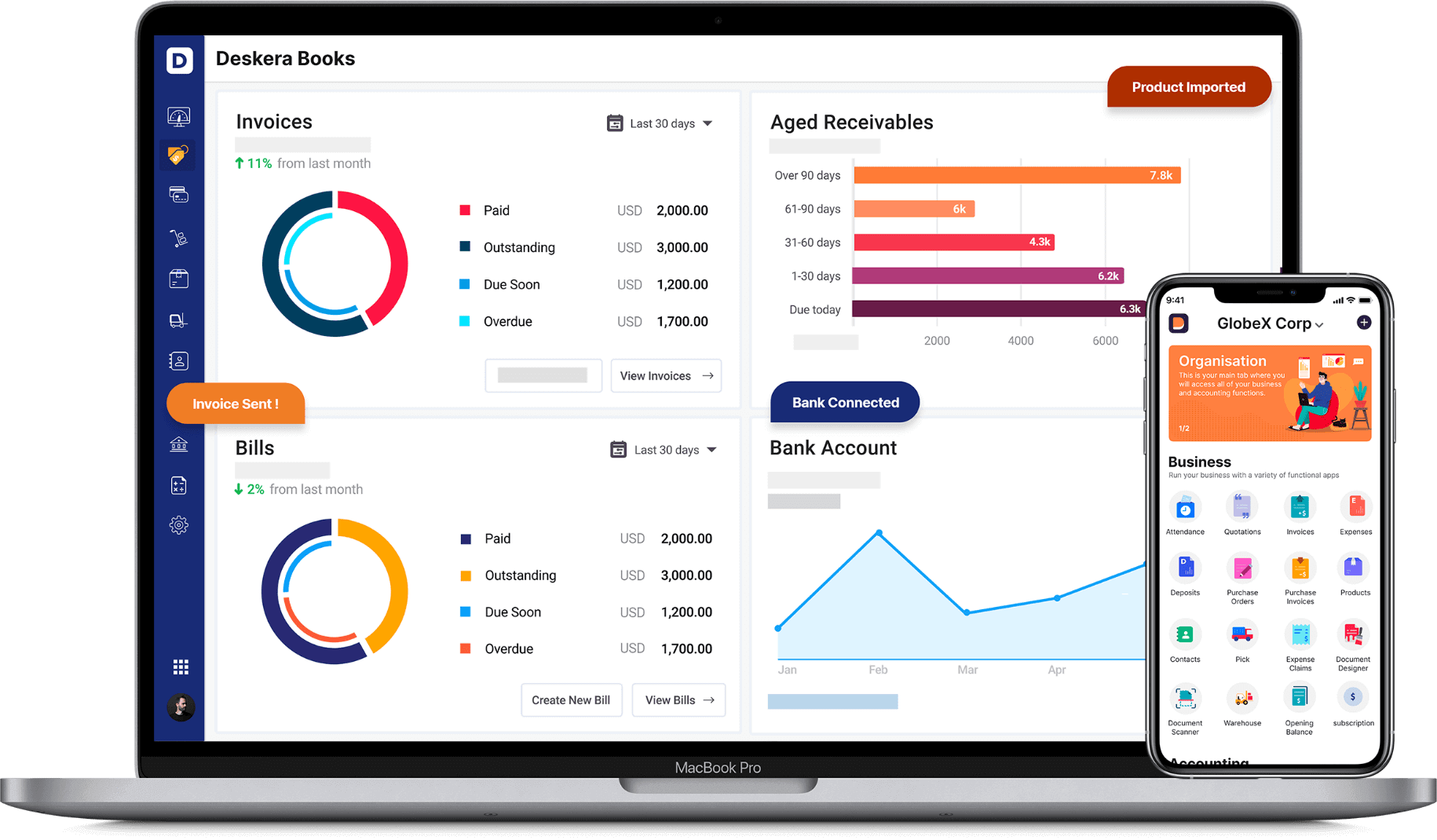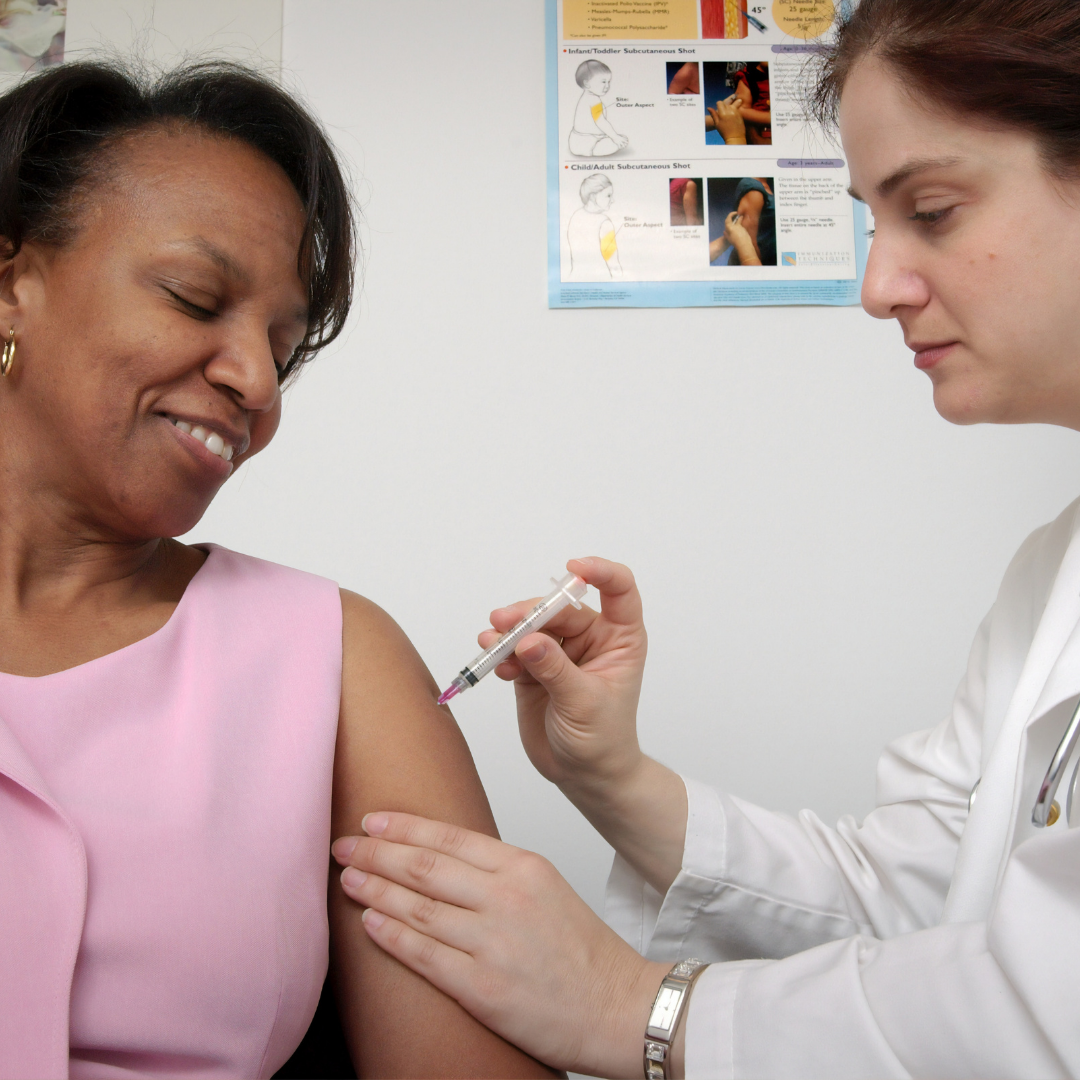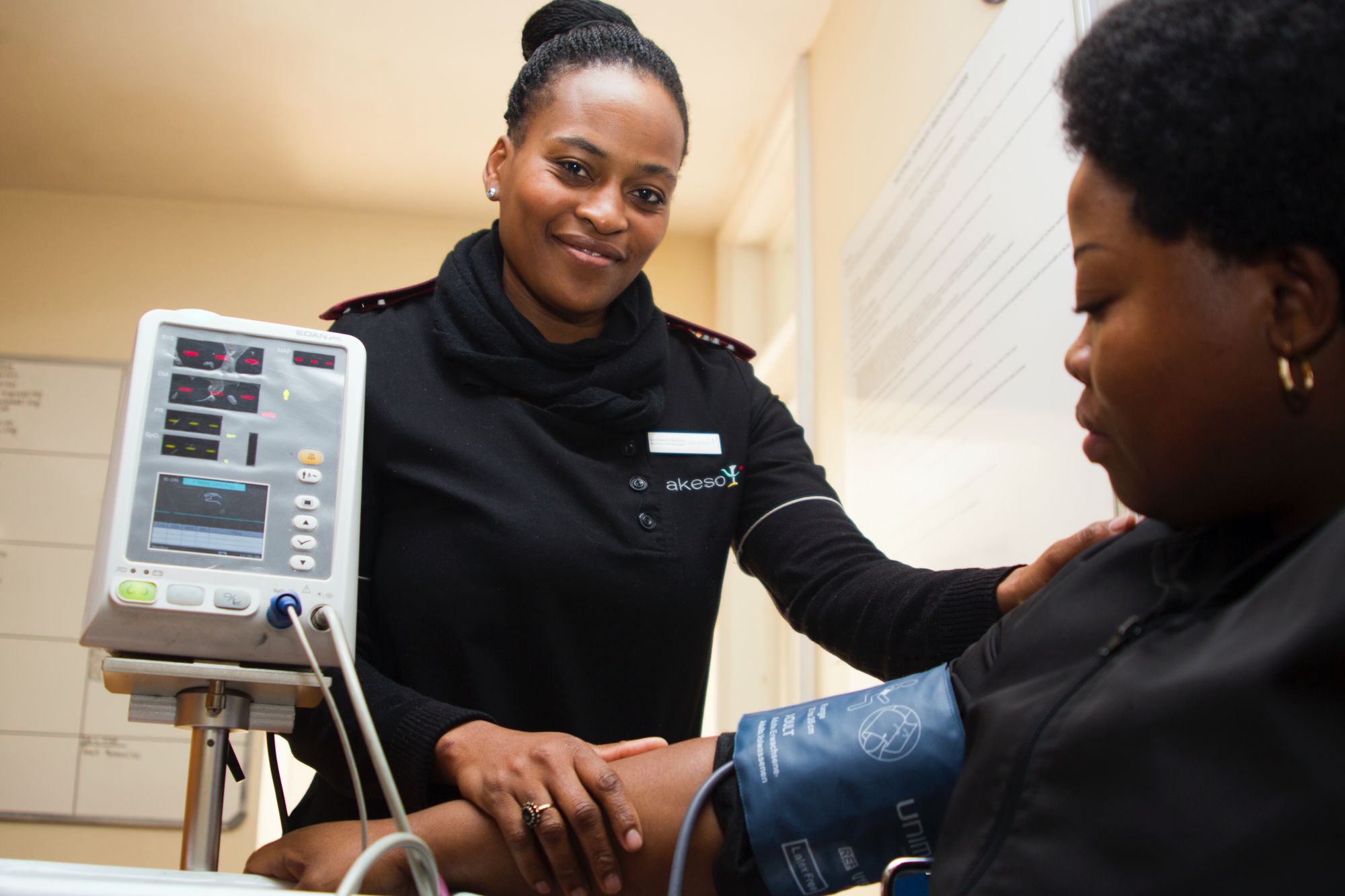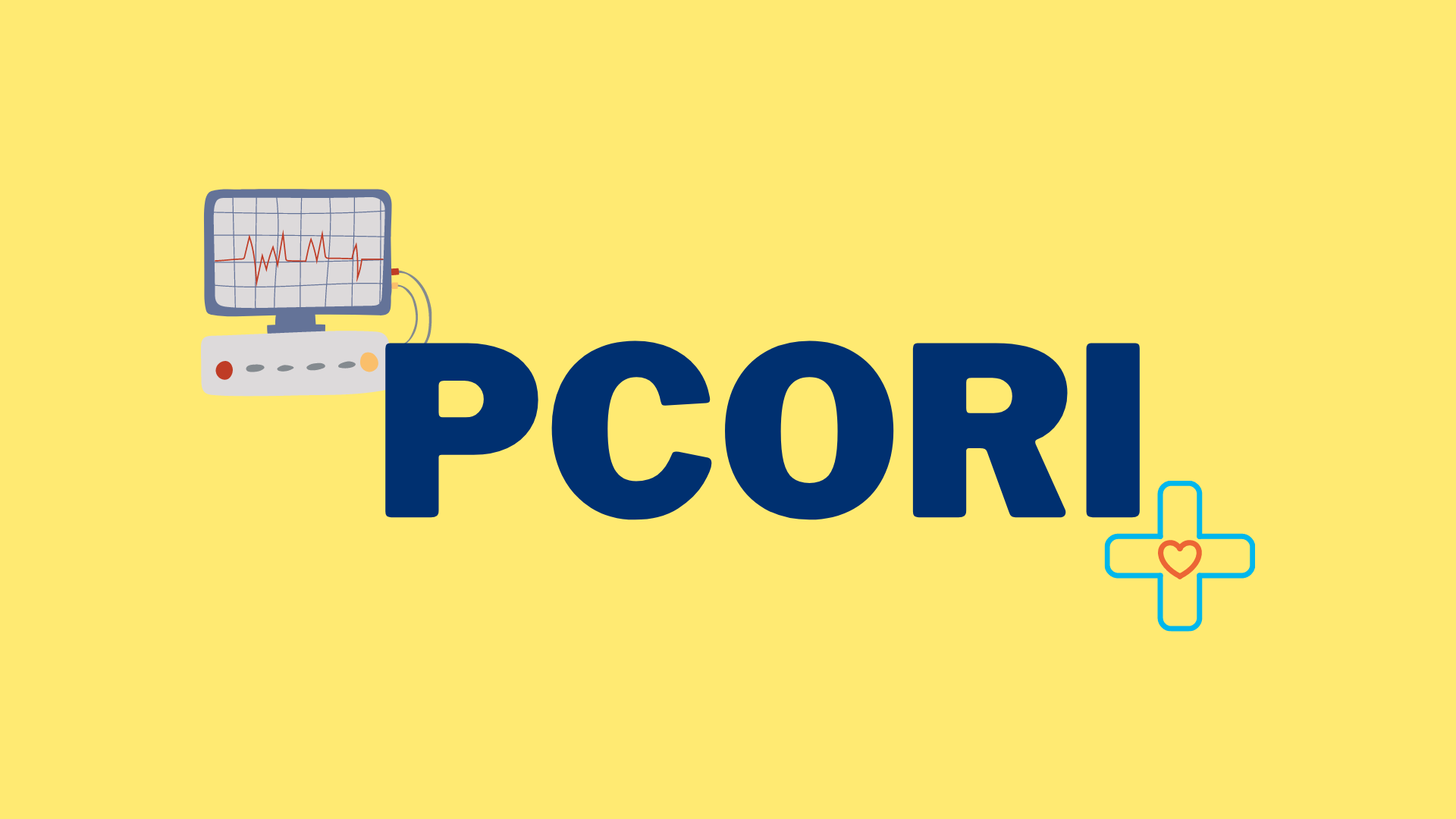Making health care decisions are one of the most crucial decisions an individual makes. Yes, we do rely on our doctors to take charge of situations where only a health care expert can help. But what if you could help make that fully informed decision? What if you could also have enough information on a health care issue so that mistakes can be avoided? These questions helped form PCORI in 2010.

PCORI, i.e., Patient-Centered Outcomes Research Institute, funds researchers focused on human welfare and health care factors. If you plan to carry out research and look for some funding, we will tell you all about PCORI and how to apply for funding with them.
This article covers the following:
- What is PCORI?
- Who is eligible to apply for a PCORI fund?
- Guidelines to apply for a PCORI fund
- Glossary
- How can Deskera assist you?
- Key takeaways
What is PCORI?
The Patient-Centered Outcomes Research Institute (PCORI) was established as part of the US Patient Protection and Affordable Care Act of 2010 to fund patient-centered comparative clinical effectiveness research, extending the concept of patient-centeredness from health care delivery to health care research. In the United States, patient-centered outcomes research is new and not defined in the legislation, and the rationale is unclear to many.
Its mission is to fund research that will provide patients, their caregivers, and clinicians with the evidence-based information needed to make better-informed health and health care decisions. PCORI is committed to continuously seeking input from a broad range of stakeholders to guide its work.
Patients play a major role in PCORI’s work by telling PCORI what health care outcomes they value. PCORI makes sure the results of its research are provided to patients and clinicians in ways that are responsive to their needs and interests and easy to understand.
PCORI is an information resource, not a care provider. In releasing its research findings, PCORI ensures that its research is not construed as mandates for practice guidelines or coverage recommendations.
Patient-centered outcomes research is designed to inform health care decisions by providing evidence on the effectiveness, benefits, and harms of different treatment options for different patients. The evidence is generated from studies that compare drugs, medical devices, tests, surgeries, or ways to deliver health care.
This research recognizes that the patient’s voice should be heard in the health care decision-making process. PCORI’s research will be responsive to patients' preferences, values, and experiences in making health care decisions and the impact diseases and conditions can have on daily life.
The quasi-governmental institute is partially funded through a $1-per-enrollee fee on certain insurers; the fee increased to $2 per person in 2013. The IRS enforces it. The new organization and its financing recently drew an attack from the Senate Republican Policy Committee.
According to the committee’s blog, this fee “represents a complete turnaround from an Administration that campaigned against taxing health benefits.”
In December, 856 project proposals flooded the PCORI office vying for funds. By March, the burgeoning staff at PCORI will have picked approximately 40 projects to fund with $26 million in grants over two years. Those will help set the tone for PCORI’s standards of research.
PCORI funds research that will show patients what options they have for treatment and the “outcomes” for a particular procedure or treatment. For example, whether one procedure has less pain or leads to longer life, or means more time off from work.
This means PCORI will be able to tell patients what the outcome is in terms of pain, what the outcome is in terms of days off from work, what the outcome is in terms of longevity. There is a patient representative on the Board.
PCORI addresses health disparities, obesity, and health care delivery systems. And one of the most exciting promises of PCORI is comparing systems of care. PCORI has different priority areas, and health equities are certainly one of them.
The goal of the institute is to provide easy-to-understand information to patients so they can make the most informed health care decisions and to help people decide what’s best for them in getting their desired health outcome - Anne C. Beal, M.D., M.P.H. Chief operating officer of PCORI.
PCORI Doesn't Fund:
- Research aimed primarily at developing and validating an instrument
- Cost-effectiveness analysis measuring dollar-cost per quality-adjusted life-year
- Comparisons that focus on the relative costs of care as the primary criterion for choosing between alternatives
- Most projects do not include patients or other healthcare stakeholders throughout the research process unless they are highly technical or methodological projects.
If you also want to get funding from PCORI, Funding announcements are posted on their website approximately four weeks before the Letter of Intent (LOI) deadline.
PCORI offers several types of funding opportunities:
- The Broad Pragmatic Studies PCORI Funding Announcements (PFA) seeks applications that address four of PCORI’s National Priority Areas for Research: Addressing Disparities; Assessment of Prevention, Diagnosis, and Treatment Options; Communication and Dissemination Research; and Improving Healthcare Systems.
Research applications addressing one of these four priority areas may include investigator-initiated topics and studies addressing intellectual and developmental disabilities and maternal mortality, representing new priorities in PCORI’s 2019 authorizing legislation.
PCORI is looking for your best ideas to address the needs of patients, caregivers, clinicians, and other healthcare stakeholders in making personalized clinical decisions across a wide range of conditions, populations, and treatments.
- Targeted PCORI Funding Announcements seek applications on specific, high-impact topics selected in response to input from patients and other stakeholders through the Advisory Panels and public workshops.
- PCORI’s Dissemination and Implementation Program currently offers three funding opportunities to support projects that actively facilitate the uptake and integration of evidence from PCORI-funded studies into real-world practice in the context of related evidence.
- Engagement program awards, primarily our Eugene Washington PCORI Engagement Awards, are not research awards, but they encourage better integration of patients and other stakeholders into the research process.
- Special One-Time Funding Opportunities
If you want to apply for a Research Award, it is a two-stage process. Please note each funding announcement has a distinct set of requirements and application templates that must be followed for your application to be reviewed and funded.
A Letter of Intent must be submitted, and an organization must be invited to submit a full application. The requirements and guidance for a successful LOI and subsequent full application are found in the full funding announcement, application guidelines, and application checklist for each specific funding opportunity.
Main Groups of Interest for PCORI:
PCORI pays attention to a number of populations in making research funding decisions:
- Racial and ethnic minorities
- Older adults
- Low-income
- Residents of rural areas
- Women
- Children
- Individuals with special healthcare needs, including individuals with disabilities, individuals with multiple chronic diseases, individuals with rare diseases, and individuals whose genetic makeup affects their medical outcomes
- Patients with low health literacy/numeracy and limited English proficiency
- Lesbian, gay, bisexual, transgender, and queer (LGBTQ+) populations/persons
- Veterans and members of the armed forces and their families.
Who is Eligible to Apply for PCORI Funding?
Eligibility for PCORI funding are as follows.
Private Sector
- Nonprofit research organizations
- For-profit research organizations
Public Sector
- Universities and colleges
- Hospitals and healthcare systems
- Laboratories and manufacturers
- Units of state, local, or federal government
US Organizations
- Only organizations that the Internal Revenue Service recognizes
Foreign Organizations and Nondomestic Components of US Organizations may apply if:
- There is demonstrable benefit to the US healthcare system, and the essential scientific needs will be met by conducting the study outside the United States or having the study conducted by non-US research organizations
- US efforts in the area of patient-centered research can be clearly shown, and the engagement plans include US patients and stakeholders and are relevant to the US healthcare system.
Note: Individuals are not permitted to apply
Guidelines to Apply for PCORI Funding
Here are a few things that you must keep in mind while applying for PCORI.
On-Time Submission
PCORI requires that applications for funding be submitted through PCORI Online no later than the published due date and time and expects applicant organizations and Administrative Officials (AO) to implement backup plans for timely submission, as needed.
Application due dates and times are listed on the Funding Opportunities page. PCORI encourages all applicants to submit their application at least one day before the stated deadline.
Applicants are required to use PCORI Online when submitting both LOls and applications. LOls and applications are considered on time if successfully submitted by the published due date and time. PCORI will not accept LOIs or applications submitted through the mail or sent via email to the Helpdesk or other PCORI email accounts.
The Right to Accept Late Submissions
PCORI reserves the right to assess and consider late submissions for individual applicants as a result of extenuating circumstances on a case-by-case basis. Additionally, PCORI reserves the right to modify the application deadline for all applicants in order to meet its business needs. Changes to the application deadline will be posted on the Funding Opportunities page and PCORI Online.
Reasons for late applications being accepted may include:
- Validated PCORI Online system issues (see below)
- Natural disaster
- Sudden acute severe illness of the Principal Investigator (Pl) or an immediate family member within 24 hours before application submission
- Death of an immediate family member of the Pl immediately before application submission.
Note: Examples listed above are for illustrative purposes only. All issues are subject to review and approval by PCORI on a case-by-case basis.
Reasons for late applications being rejected may include:
- Failure to complete required registrations in advance of the due date
- Competing responsibilities or other deadlines
- Personal events
- Non-severe acute health conditions
- PCORI Online issues not verified by PCORI
Requesting an extension:
All extension requests must be submitted to pfa@pcori.org within 24 hours of the specified submission deadline by the PI, CC’ing, the institutional AO, listed on the application. PCORI will provide a written response within two business days of receiving such requests.
Due to PCORI’s accelerated Merit Review schedule, the maximum post-deadline extension PCORI may allow 24 hours (24 hours from the time approval is granted), except for natural disasters, which will be evaluated on a case-by-case basis.
Requests from the PI or AO must be submitted to pfa@pcori.org and include the following information:
- PCORI Request Number (application number)
- PCORI Funding Announcement (PFA)
- Full name of the submitting institution, including department or functional unit
- Full contact information for the Pl (name, address, phone, and email)
- Full contact information for the AO (name, address, phone, and email)
- Thorough explanation of why an extension is warranted
Of note, requests for extension may only be authorized in writing by the designed staff in Program Support and Information Management. Extension requests will not be granted over the phone or in person.
PCORI Online System Issues
In rare cases, late applications will be considered when there is clear evidence of a PCORI Online system error. PCORI will not penalize applicants who experience confirmed PCORI Online system issues that are beyond their control and cause an inability to submit a research application on time.
PCORI Online system errors identified by the applicant user must be reported to PCORI at pfa@pcori.org (or help@pcori.org in some instances) before the submission deadline.
Events that may not be considered systems errors include:
- Failure to follow funding opportunity instructions
- Failure to follow application guideline instructions
- Failure to follow PCORI Online instructions
- Failure to complete the required organizational and investigator registrations
- Entry of incorrect investigator and organizational contact information (e.g., wrong AO listed in PCORI Online)
- Failure to correct PCORI Online validation errors/warnings by the deadline
- Local internet, hardware, or software problems at the institution
- Problems with local submission systems (e.g., system-to-system solution)
- Forgotten credentials or using wrong credentials
- Application image issues resulting from file conversion at the applicant institution
- Failure to notify the PCORI Online Help Desk of submission issues by the posted deadline
- Accidental withdrawal of an application
- Not receiving PCORI Online generated notifications, but status is available in PCORI Online for viewing (e.g., pending AO approval notification)
Notifying PCORI of System Issues
Email PCORI’s Helpdesk at pfa@pcori.org of any systems issues before the deadline. Of note, emailing PCORI’s Helpdesk before the deadline does not exempt the applicant from applying on time.
PCORI makes every attempt to respond to Helpdesk tickets within 48 hours. However, during peak submission times, PCORI may not respond to all tickets prior to the deadline. PCORI cannot overstress the importance of assembling the application early and submitting the application before the deadline.
Following are a few suggestions from PCORI if you are facing any issues in preparing the application:
- Refer to the PCORI Funding Announcement (PFA) and Application Guidelines: These two documents outline all of the required documents and fields. Additionally, instruction on how to properly upload attachments is listed in both the Application Guidelines and PCORI Online system manual.
- Refer to the PCORI Online system manual: This manual provides screenshots of PCORI Online and additional guidance on how to navigate the system.
- Contact the Helpdesk: If you are unable to resolve your issue, email the Helpdesk at pfa@pcori.org.
To ensure a timely response, you must include the following information:
- PCORI application number
- PCORI Funding Announcement (PFA)
- Full name of the submitting Institution, including department or functional unit
- Pl name and contact information (name, address, phone, and email)
- A detailed explanation of the issue(s), including screenshots as appropriate
Use PCORI's Help Desk
PCORI provides administrative and technical support to applicants through its Helpdesk (pfa@pcori.org). PCORI responds to Helpdesk tickets Monday - Friday during normal business hours (8:30 am-5:30 pm ET).
To expedite response time, applicants only submit one ticket per issue. Please only reply to the email chain you started if additional guidance is needed, rather than creating new emails.
This will help PCORI track applicant concerns within the system and expedite resolution. Having multiple project team members contact PCORI regarding the same issue will slow the response time or result in conflicting information.
Authorized Users
It is important to note that PCORI can only share application information with the Pl, AO, and Pl Designee. PCORI cannot alter an application at the request of collaborators, co-Investigators, consultants, etc.
PCORI personnel cannot submit an application at the request of the AO or Pl over the phone. Once an application has been submitted, only the Pl or AO may request that it be rescinded, and the request must be made in writing (received via postal mail service or official email). Only the PI or AO may submit a PCORI application and request an extension.
Glossary - Important Terms
Important terms that you must know about:
Administrative Official (AO)
An individual within the recipient organization who is responsible for the proper administration of the contract, including, but not limited to, overseeing the submission of the contract activation, contract renewals, and additional materials required by PCORI’s policies and procedures.
Advisory Panel
Advisory panels provide recommendations to PCORI’s Board of Governors, Methodology Committee, and staff to help plan, develop, implement, improve, and refine the research agenda. While the panels do not hold decision-making authority, they are critical to PCORI’s ongoing effort to ensure that patients and stakeholders provide substantive input into the refinement of the institute’s research portfolio and other activities.
Allowable Costs
A cost that is approved within the budget and is not otherwise unallowable under the PCORI Funded Research Policies. A direct cost is allocable to the project if the goods or services involved are chargeable or assignable to the project in accordance with relative benefits received or other equitable relationships.
As a result, a cost is allocable to the funded project if (1) it is incurred solely to advance the work under the project, or (2) it benefits both the funded project and other work of the recipient organization, in proportions that can be approximated through use of reasonable methods.
Award Page Title
A less-technical, often abbreviated version of the researchers’ project title.
Awarded - Contract Pending
The project has been approved by PCORI’s Board of Governors, and it is receiving a PCORI business and programmatic review or the final research contract is being executed.
Awardee
An organization that has received a PCORI award.
Biosketch
A profile of the experience and accomplishments of the key personnel in an application. A biosketch also satisfies the requirements of the PCORI professional profile.
Board Approval Date
The date of approval to fund by the PCORI Board of Governors. The actual project start dates vary as project milestones must be negotiated before the contract can be fully executed.
Board of Governors
A 21-member Board of Governors governs PCORI. The Board represents a broad range of perspectives and collective expertise in clinical health sciences research.
The Comptroller General of the United States appoints members of the Board, including its Chairperson and Vice Chairperson, in accordance with PCORI’s authorizing law.
Broad PCORI Funding Announcements (PFA)
These announcements seek investigator-initiated applications for patient-centered comparative clinical effectiveness research (CER) projects aligned with the five priority areas for research. An announcement in each area is posted twice a year.
Burden
The frequency of the condition, the expected mortality and morbidity, and/or the degree of suffering associated with symptoms, complications, or other consequences of the condition.
Additionally, it may include the costs to the US population of healthcare services used, the individual patient’s out-of-pocket expenses, as well as intangible costs to the patient, such as time away from paid or unpaid occupations.
Care Transitions
The movement patients make between different clinicians or settings, such as from a hospital to home or a nursing facility, during the course of their illness.
Clinical Data Research Networks (CDRN)
CDRNs are networks that originate in healthcare systems, such as hospitals, health plans, or practice-based networks, and securely collect health information during the routine course of patient care.
Clinical Practice Guidelines
Systematically developed statements or recommendations to assist practitioner and patient decisions about appropriate health care for specific clinical circumstances.
They present indications for performing a test, procedure, or intervention or the proper management for specific clinical problems. Guidelines may be developed by government agencies, institutions, organizations such as professional societies or governing boards or by convening expert panels.
Closeout
The process by which PCORI determines that all applicable administrative actions and all required work of the contract have been completed and officially closes the contract.
Co-Investigator (Co-I)
An individual is recognized by the prime institution and the principal investigator (PI) as someone making a significant contribution to a project. The Co-I is an individual on who the PI relies to assume responsibilities related to the execution of the project and to commit a specified percentage of time to the project.
A Co-I is considered “key personnel” and may be employed by or formally affiliated (through written agreement) with the prime institution or a collaborating institution.
The patient and/or stakeholder partner may be listed as a Co-I. The designation of a Co-I does not affect the PI’s roles and responsibilities nor does it imply a Dual PI Award.
Co-Principal Investigator (Co-PI)
An individual recognized by the prime institution and the principal investigator (PI) as someone who shares scientific and administrative leadership responsibilities for a project with the PI.
The Co-PI is an individual who the PI relies on to contribute substantively to the scientific development and direction of the project in addition to the execution of the project.
The Co-PI shares responsibility with the PI for ensuring that milestones are achieved and contracted deliverables are completed on time. The Co-PI is considered “key personnel” and may be employed by or formally affiliated (through a written agreement) with the prime institution or a collaborating institution.
The patient and/or stakeholder partner may be listed as a Co-PI. The designation of a Co-PI does not affect the PI’s roles and responsibilities, nor does it imply a Dual PI Award.
Collaborative Research Groups (CRG)
These groups are composed of content experts from within PCORnet focused on generating high-priority, engaging research questions to leverage PCORnet’s unique infrastructure.
The CRGs collaborate with stakeholders including patients, caregivers, advocacy groups, providers, and funders early on to move research forward more quickly and more efficiently.
Common Data Model (CDM)
A CDM establishes a standard way of defining and formatting data.
Comparative Effectiveness Research (CER)
The direct comparison of two or more existing healthcare interventions to determine which interventions work best for which patients and which interventions pose the greatest benefits and harms.
The core question of CER is which treatment works best, for whom, and under what circumstances.
Comparators
Two or more options for diagnosis, prevention, treatment, or healthcare delivery would be available to the patients, caregivers, providers, and/or health systems facing the actual healthcare decision.
For PCORI studies, usual care should not be used as a comparator unless it represents a legitimate and coherent clinical option (e.g., a clinical alternative based on guidelines).
Conflict of Interest
As defined by PCORI’s authorizing legislation, a Conflict of Interest is any “association, including a financial or personal association, that has the potential to bias or has the appearance of biasing an individual’s decisions in matters related to the Institute or the conduct of activities” [Patient Protection and Affordable Care Act, Pub L No. 111-148, 124 Stat 727, §6301(a)(3)].
Conflicts of Interest will be considered and managed throughout every step of the review and selection process, including, but not limited to, the technical and programmatic reviews, the selection and assignment of scientific and stakeholder reviewers, Board of Governor's deliberations, and post-award negotiations and monitoring.
Consultant
Typically an individual who is not involved with the management of the project but instead provides general services or subject matter expertise for an hourly fee. Applicants must include a letter of support from the consultant detailing their work and rate of compensation per hour. The patient and/or stakeholder partner may be listed as a consultant.
Contact Principal Investigator (PI)
If electing to submit a Dual PI Award application with two PIs, the prime institution must designate one PI as the Contact Principal Investigator. The Contact PI is the PI responsible for submitting the application and all contracted deliverables to PCORI and will serve as PCORI's primary point of contact for all communication.
The Contact PI must be employed by or formally affiliated (through written agreement) with the prime institution and is named in the awarded contract.
Contract
The legally binding document that PCORI uses to make awards for projects.
Data and Safety Monitoring Board
An independent committee of experts responsible for reviewing research study data on an ongoing basis to ensure the safety of study subjects and validity and integrity of the data.
Data Universal Numbering System (DUNS)
A unique identifier is assigned to a single business entity. You may apply for a DUNS number online.
Decisional Dilemma
They are challenging clinical choices faced by patients, caregivers, clinicians, or health systems about what works best for whom and under what circumstances.
PCORI studies should be designed to support better-informed decisions by generating evidence that improves understanding of the risks and benefits of the available options.
Detailed Description of Engagement in Health Research
Manuscripts with a primary objective of reporting a detailed description of the conduct and/or impacts of engagement within the context of a health research study.
Dissemination (active)
The intentional, active process of identifying target audiences and tailoring communication strategies to increase awareness and understanding of evidence, and to motivate its use in policy, practice, and individual choices. The purpose of dissemination is to spread and sustain knowledge and the associated evidence-based interventions.
Dissemination (passive)
Sometimes called research diffusion, is an untargeted dissemination process whereby new evidence is absorbed and acted upon by a small body of highly motivated recipients.
Dissemination and Implementation Award
Funding to promote dissemination and implementation of evidence through two award opportunities: Eugene Washington PCORI Engagement Awards Program and PCORI Limited Competition Awards for Disseminating and Implementing Research Findings. See also Eugene Washington PCORI Engagement Award.
Draft Final Research Report
The draft final research report documents all of the work completed in the PCORI-funded study. This report must include a detailed description of the study’s background, methods, results, and conclusions, consistent with PCORI’s Process for Peer Review of Primary Research and Public Release of Research Findings.
The draft final research report goes through external peer review and may be revised by the awardee before it is accepted by PCORI as the final research report.
Dual Principal Investigator (PI) Award
An award in which the prime institution has designated two individuals as PIs who share equally the authority and responsibility for leading and directing the project, intellectually and logistically.
The presence of two PIs on an application or award diminishes neither the responsibility nor the accountability of any individual PI.
Electronic Health Record (EHR)/Electronic Medical Record (EMR)
An electronic health record is a repository of electronic information about an individual’s health status and health care. EHRs contain much of the same information that is found in a patient’s (paper) medical chart, but because the records are digitized, the data can be viewed, and providers (e.g., primary care physicians and specialists) can capture far more extensive information. EHRs may contain administrative and billing data, patient demographics, progress notes, vital signs, medical histories, diagnoses, medications, immunization records, allergies, radiology images, laboratory and other test results, and much more.
Employer Identification Number (EIN)
The Federal Tax Identification Number is used to identify a business entity. You may apply for an EIN in various ways, including online.
Engagement Award Initiative Notice (EAIN)
A targeted funding notice within the Engagement Awards Program. The purpose is to provide guidelines for available funding support for meetings and conferences that align with PCORI’s mission and strategic plan and to also facilitate the expansion of PCOR and CER.
Engagement in Research
The meaningful involvement of patients, caregivers, clinicians, and other healthcare stakeholders throughout the research process—from topic selection through design and conduct of research to dissemination of results.
Engagement Plan
A defined strategy to effectively involve patients, caregivers, clinicians, and relevant healthcare stakeholders throughout the research process. Applicants should reference the Engagement Rubric while developing this plan.
Engagement Program Awards
These awards include Eugene Washington PCORI Engagement Awards and Pipeline to Proposal Awards, which endeavor to increase patient and other stakeholder engagement in healthcare research.
This program does not support research studies. The focus is on finding innovative approaches to increase the capacity for non-researchers engagement in PCOR and CER.
Engagement Rubric
A resource intended to provide guidance regarding engagement in the conduct of research to those planning or conducting research, merit reviewers, awardees, engagement/program officers (for creating milestones and monitoring projects), and interested patients, caregivers, patient/caregiver organizations, and other stakeholders.
Eugene Washington PCORI Engagement Award
These awards are designed to help build a national community of patients, caregivers, clinicians, researchers, and other healthcare stakeholders who will advance patient-centered CER.
Evidence for Engagement
Manuscripts that include a formal evaluation of engagement within the context of a health research study, or a study with the primary objective to evaluate or synthesize engagement methods/impacts in health research.
Evidence Updates
These materials present information from recent PCORI studies or from systematic reviews that summarize the evidence. Created in collaboration with patient organizations, clinicians, and others with an interest in the findings, these materials bring timely and relevant information to audiences who can benefit from knowing and using the information.
Example of Engagement in Health Research
Manuscripts with a primary objective of reporting on a health research study that engaged partners in at least one phase of the research and describes at least one impact of engagement on their work.
Final Research Report
The Final Research Report is a comprehensive account of all the work done in this study and has been peer-reviewed by research experts and patients with lived experience.
It includes details on the investigators' work with patients and other stakeholders throughout the study process. It also includes important information about what did not work in the planned research and lessons investigators learned that would inform future research.
Financial Official (FO)
The individual designated by the recipient organization is responsible for the proper accounting of contract funds and the submission of payment details. The FO is responsible for completing and certifying the required yearly expenditure reports.
Framework, Editorial, Commentary
Manuscripts that express a theoretical view on engagement in health research, including scientific commentaries, opinion briefs, or conceptual pieces such as models or frameworks.
Fringe Benefits
A form of payment for the performance of services. Fringe benefits commonly include health insurance, group term life coverage, and nonwage compensation.
Funding Announcement
See Broad PCORI Funding Announcements (PFA), Targeted PCORI Funding Announcements, Pragmatic Clinical Studies PCORI Funding Announcements, and Engagement Programs Awards.
Greater-Than Request
A request for budget and/or time that exceeds the total award amount and/or maximum project period specified in the funding announcement.
Health Conditions
These are the broad terms we use to categorize the funded research studies; specific diseases or conditions are included within the appropriate larger category.
Note: Not all of the funded projects focus on a single disease or condition; some touch on multiple diseases or conditions, research methods, or broader health system interventions. Such projects won’t be listed by a primary disease/condition and so won’t appear if you use this filter tool to find them.
Implementation
The deliberate, iterative process of integrating evidence into policy and practice through adapting evidence to different contexts and facilitating behavior change and decision making based on evidence across individuals, communities, and healthcare systems.
Implementation Project Title
The original title of the project is supplied by the principal investigator or project lead/team.
Indirect Costs
Costs not directly accountable to the project. Indirect costs include taxes, administration, personnel (not directly related to the project), and security costs.
Inpatient Costs
Costs incurred for patient study participants who are formally admitted to a hospital on doctor’s orders.
Institutional Review Board (IRB)
A group that follows federal regulations, state laws, and institutional policy to review, monitor, and approve research in order to protect the ethical rights and privacy of the subjects involved.
Intervention Strategies
PCORI funds comparative clinical effectiveness research (CER) studies that compare two or more options or approaches to health care, or that compare different ways of delivering or receiving care.
Key Personnel
Individuals who contribute to the scientific development or execution of the project in a substantive and measurable way. The contribution is independent of financial compensation.
Letter of Intent or Letter of Inquiry (LOI)
A notification to PCORI that an organization intends to apply. Submission of an LOI is a prerequisite to submitting an application. The Letter of Intent or Letter of Inquiry also includes information describing the proposed project.
Letters of Collaboration
Signed letters from each collaborating individual or organization will demonstrate that the PI has the support or resources necessary for the proposed work.
Letters of support from patient and stakeholder partners should clearly describe the origin of the study topic and the role of the patient partners in defining the question, outcomes, comparators, goals, outcomes, etc.
Letters from the partners or partnering organizations affirming support to disseminate and implement research findings that are germane and warranted for implementation are also highly encouraged.
Letters of Organizational Support
Letters of support signed by the Department Chair or appropriate organizational official, confirming the institutional support of the proposed project, space to conduct the research, equipment, and other resources available for the project, including staff.
A letter from the leadership of your department or organization affirming support to disseminate research findings that are appropriate and warranted for implementation may also be included.
Limited Competition
The process by which only certain groups may apply for an award, such as only PCORnet networks or teams that have a completed PCORI project.
Merit Review
A review of the scientific and technical merit of applications for funding. Merit review consists of both online and in-person reviews by qualified reviewers who read, score and provide feedback on the applications.
Merit Review Officer (MRO)
A scientist who presides over a merit review panel and is responsible for coordinating and reporting the discussion of each application assigned to it. The MRO serves as an intermediary between the applicant and reviewers and prepares summary statements for all applications reviewed.
Methodology Committee
Per PCORI’s authorizing legislation, the 17-member group working to develop and advance scientific methods in patient-centered outcomes research. The Methodology Committee is a sub-tending committee that supports the PCORI Board of Governors.
Organization
The institution/organization in which the project originates or the primary institution or organization that received funding for the project.
Other Principal Investigator
An additional lead investigator. This investigator may be affiliated with a different institution or organization from the Principal Investigator.
Outpatient Costs
Costs incurred for patient care when the patient is not formally admitted to a hospital.
Patient Engagement
Involvement of patients and other stakeholders throughout the planning, conduct, and dissemination of the proposed projects.
Patient Investigator
Patients or other stakeholders involved in the investigation of PCORI research have a role in guiding the aims of the study.
Patient Partners
Patients who are representative of the population of interest in a study, as well as their family members, caregivers, and the organizations that represent them.
Patient partners are not to be confused with patient subjects; patient partners are members of the research team and involved in the research's planning, conduct, and dissemination, whereas patient subjects are those individuals enrolled in the study as participants.
Patient-Centered Outcomes Research (PCOR)
Research that helps people and their caregivers communicate and make informed healthcare decisions while allowing their voices to be heard in assessing the value of healthcare options. This research answers patient-centered questions.
Patient-Powered Research Networks (PPRN)
PPRNs are operated and governed by patient groups and their partners and are focused on particular conditions or populations.
Patients
Individuals who have or have had the condition under study; it may include patient surrogates or caregivers as well. It does not necessarily mean, but does not exclude, patient advocates or patient navigators.
Patients and Public Stakeholders
The patient and public stakeholders are involved as the intended use of the tool and/or resource, as applicable.
Payers
Those who function as financial intermediaries in the health system, including private insurers and public insurers, and organizations representing insurers, such as America’s Health Insurance Plans.
PCORI Funding Announcement (PFA)
PCORI's notice of a funding opportunity and request for applications. A PFA describes their intent to fund research in specific areas. Each PFA has a summary of the opportunity and guidance for proposing research for funding. It is accompanied by Application Guidelines and templates or forms for submission through PCORI Online.
PCORI Funding Center
The central location on PCORI’s website is where applicants can access all templates, guidelines, information, and training needed to prepare and submit an application.
PCORI Information Request
During the application phase, the process by which PCORI program staff or contract staff request additional information from an applicant by a defined deadline, usually to address questions or concerns.
PCORI Online System
PCORI’s online application and award management system, designed to facilitate the applicant’s submission of materials, and the activation of a contract through completion and closeout. Available in the PCORI Online system.
PCORnet
PCORnet is a network of networks that brings together patients, clinicians, researchers, and healthcare systems to share information and participate in research.
Peer Review
The goal of peer review is to ensure that the primary research studies funded by PCORI are held to the highest standards of scientific integrity, methodological rigor, and relevance and usefulness to patients, caregivers, clinicians, and other healthcare stakeholders.
The process includes a review of study findings by content experts, methodologists, patients, and other healthcare stakeholders with experience related to the study.
Phases of Research
These are phase(s) of research in which stakeholders were engaged as described in the tool and/or resource, if applicable.
Phases of Research Engagement
These are phases of research in which stakeholders were engaged as described in the article, if applicable.
Pilot Project
PCORI funded the Pilot Projects to explore how to conduct and use patient-centered outcomes research in ways that can better serve patients and the healthcare community.
Pipeline to Proposal Award
The Pipeline to Proposal Awards program provides seed money to individuals and groups who have healthcare research ideas and an interest in patient-centered CER.
The awards will be used to build capacity and engage the community around a healthcare research interest. These awards focus on building the community of patients, stakeholders, and researchers who can participate in patient-centered outcomes research.
Populations
PCORI is interested in research that seeks to better understand how different clinical and health system options work for different people. These populations are frequently studied in its portfolio or identified as being of interest by their stakeholders.
Pragmatic Clinical Study (PCS) PCORI Funding Announcements
These announcements seek applications for pragmatic clinical trials, large simple trials, or large-scale observational studies that compare two or more alternatives for prevention, diagnosis, treatment, or management of a disease or symptom; improving healthcare system-level approaches to managing care; or eliminating health or healthcare disparities.
Principal Investigator
The lead researcher and primary contact for the project.
Professional Profile
A profile of the experience and accomplishments of a person who will play a significant role in a PCORI-funded research project. Also, see Biosketch.
Program Director
The individual(s) designated by the applicant organization to have the appropriate level of authority and responsibility to direct the project or program to be supported by the award.
The applicant organization may designate multiple individuals as Program Directors/Principal Investigators (PD/PIs) who share the authority and responsibility for leading and directing the project, intellectually and logistically.
When multiple PD/PIs are named, each is responsible and accountable to the applicant organization, or as appropriate, to a collaborating organization for the proper conduct of the project or program, including the submission of all required reports.
The presence of more than one PD/PI on an application or award diminishes neither the responsibility nor the accountability of any individual PD/PI.
Programmatic Review
A review of the scientific portion(s) of the application to ensure that it meets PCORI’s programmatic requirements. These may include but are not limited to: the presence of a CER question, the absence of a cost-effectiveness question, and, when applicable, addressing the specific research question in a targeted funding announcement.
Project End Date
Includes the research project period and may be subject to modification to allow other research-related activities such as peer review.
Project Lead
This is the primary person on a contract or application for funding. He or she serves as PCORI’s primary point of contact for that contract or application.
Project Status
View definitions of the life cycle of an awarded project.
Project Title
The original title of the project is supplied by the principal investigator or project lead/team.
Project Type
Research projects are designed for two purposes: to improve patient outcomes by comparing two or more care approaches and to enhance the methods and infrastructure needed to support such research.
Engagement in research projects is designed to encourage better integration of patients and other stakeholders into the research process, and they are not research studies.
Research infrastructure projects are designed to either:
(1) enhance and optimize network infrastructure and promote PCORnet’s sustainability goals, or
(2) develop the role of patient- or participant-driven organizations to advance health outcomes improvement and guide the clinical and care-delivery research enterprise.
Dissemination and implementation projects either:
(1) support the uptake of findings from PCORI-funded research in real-world practice to improve health care and health outcomes, or
(2) promote the use of effective shared decision-making approaches in healthcare settings to help patients and their clinicians make choices that are best for them. Projects marked as Other Evidence Products fall within the broader research synthesis efforts, which take advantage of a wide variety of tools to pull together and analyze results for public use.
Public Abstract
A summary of the research plan or research findings that is written for, and accessible to, a general lay audience.
Purchasers
Those who purchase health benefits for employees and their dependents, including individual businesses as well as local, state, regional, and national business groups, coalitions that represent businesses, and health coalitions.
Randomized Controlled Trial (RCT)
An experiment in which participants are randomly allocated to receive one of two (or more) diagnostic, preventive, therapeutic, or palliative interventions and are then followed to determine the effects of the intervention.
Reasonable Costs
A cost may be considered reasonable if the nature of the goods or services acquired or applied is appropriate and justifiable. The amount involved reflects the action that a prudent person would have taken under the circumstances prevailing at the time the decision to incur the cost was made.
Renewed Support
Approval of an additional funding period for the same project within the approved project period. The original agreement will remain in place and additional funds obligated near the end of each funding period.
Any funds remaining on the contract prior to the new obligation will remain available for the recipient’s use.
Research Team
A group of people organized to function cooperatively to design and conduct research. For PCORI, teams should be interdisciplinary and include patients and other stakeholders as key contributors to the research process.
Resource Focus
These help to identify how the tool or resource can be used to support engagement efforts in patient-centered outcomes research.
Resubmission
An application that was submitted and received a summary statement, but was not funded and is being resubmitted to the same PFA for new consideration.
An application that was withdrawn before merit review, or an LOI that was not invited to provide a full application, would not be considered a resubmission.
Shared Decision Making
An intervention or approach that draws on and presents available evidence to inform patients of available treatment options and their risks and benefits and either engages patients in a decision-making process with their clinician or promotes their ability to engage in such a process.
Stakeholder Involvement
If applicable, these stakeholder groups are actively engaged in the research as described in the article.
Stakeholder Partner
Members of constituencies based on professional, rather than personal, experience. These can include clinicians, healthcare purchasers, payers, industry, hospitals and other health systems, policymakers, training institutions, and researchers. Some individuals may fit into several categories.
Stakeholders
Stakeholder partners may include members of constituencies based on professional, rather than personal, experience. For example, these constituencies can include: clinicians, purchasers, payers, industry, hospitals and health systems, policymakers, and training institutions. Some individuals may fit into several categories.=
State
The state where the project originates, or where the primary institution or organization is located.
Study Advisory Committee
For Targeted PFAs and Pragmatic Clinical Studies (PCS), the SAC described in the PFA is to ensure that a broad spectrum of patients and other stakeholders advise and assist the research team with refining the study questions, outcomes, and protocols.
These patients and other stakeholders must include national or regional organizations that represent, at a minimum, patients, caregivers, clinicians, policymakers, and other healthcare system stakeholders.
Study Registration
PCORI-funded studies are required to register in ClinicalTrials.gov (NCT) or the National Library of Medicine’s Health Services Research Projects in Progress (HSRP) database.
Study registration information includes study aims, patient population eligibility, interventions and comparators, outcomes measures, and, as required, participant recruitment status.
Subcontractor
An individual or group takes a portion of a contract from the prime contractor (awardee) or from another subcontractor.
Summary Statement
For applications that are discussed at the in-person merit review meeting, the summary statement includes a final overall average application score, a summary of the application discussion at the in-person merit review meeting, and preliminary online reviewer critiques.
For applications that are not discussed at the in-person merit review meeting, the summary statement includes only the preliminary online reviewer critiques. Summary statements no longer include any preliminary review scores.
Systematic Review
A synthesis and critique of existing literature can identify evidence gaps and inform decisions regarding how to address these gaps.
Targeted PCORI Funding Announcements
These announcements seek applications on specific, high-impact topics selected in response to input from patients and other stakeholders through their advisory panels and public workshops. These are one-time opportunities.
Targeted PFAs
Announcements that seek applications on specific, high-impact topics are selected in response to input from patients and other stakeholders through their advisory panels and public workshops. These are one-time opportunities.
Technical Abstract
A summary of the research plan that is written for scientists and researchers.
Timeframe
Length of follow-up for collecting data on primary outcomes.
Transitional Care
A range of services is designed to ensure continuity and promote safe and coordinated transitions between settings and clinicians.
Transitional Care Evidence to Action Network
A network of PCORI-funded awardee teams and stakeholders collaborating around the topic of transitional care.
Year Awarded
The year the PCORI Board of Governors approved funding for the project or the year the proposal received a notice of award.
How Can Deskera Assist You?
Deskera Books can help you automate your accounting and mitigate your business risks. Creating invoices becomes easier with Deskera, which automates a lot of other procedures, reducing your team's administrative workload.

Key Takeaways
- The Patient-Centered Outcomes Research Institute (PCORI) was established as part of the US Patient Protection and Affordable Care Act of 2010.
- It was formed to fund patient-centered comparative clinical effectiveness research, extending the concept of patient-centeredness from health care delivery to health care research.
- Private sector organizations, including non-profit and pro-profit organizations, public sector organizations, and U. S organizations, are eligible for the PCORI funding.
- Foreign Organizations and Nondomestic Components of US Organizations may apply under certain conditions/rules and regulations.
- On-time submission, accepting the applications later under selected conditions, selected reasons for late submission, and selected extensions are some of the guidelines for applying for PCORI funding.
Related Articles:












